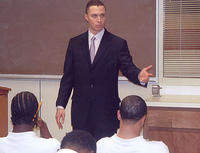 Yesterday evening Congressman Harold Ford Jr. visited Vanderbilt law school where he gave a speech regarding campaign finance.
Yesterday evening Congressman Harold Ford Jr. visited Vanderbilt law school where he gave a speech regarding campaign finance.David Bander from Forward With Ford has the details:
"Yes, Congressman Harold Ford Jr. (D-TN) spoke to my Campaign Finance & Election Law class. I took notes that are more or less verbatim - here they are!
Jim Hester, the campaign manager, spoke first. He said some interesting things about the campaign. He thinks the Democratic base is about 46.5% of the electorate in Tennessee, or about 800,000 projected voters. Therefore, he said, the task of the campaign is to mobilize those 800,000 voters and add another 100,000 swing voters to put Ford over 50%. Hester acknowledged that Tennessee has become more of a red state in recent elections, but said that the fact that it looks like the Republicans won't mount a serious challenge to Bredesen is a good sign. Usually, he said, the gubernatorial campaign is the most important election in an off year, but in 2006 it looks like the Senate race will draw the most attention. Hester also said that one of his strategies is to just get Ford out there meeting people as much as possible, because he's so charismatic.
Ford spoke for about 15 minutes, and he talked a lot about campaign finance. When he came to the House in 1996, he was elected president of his freshman congressional class, and spent much of his time on campaign finance legislation (it was known as Shays-Meehan in the House, I think). He said that many of the congressmen had the Adam Schiff - Jim Rogan conflict on their minds; Schiff and Rogan battled each other over the same California congressional seat for years, and broke records for total campaign spending.
He said that while he thinks that the McCain-Feingold legislation was a good start, it doesn't do enough to address the problem of independent expenditures by groups not officially affiliated with a campaign. He said that he supports the Meehan-Emanuel bill, which would toughen lobbyists' disclosure requirements. He also supports a similar bill for the Tennessee legislature.
In response to a question, Ford described the need to have some kind of national pre-kindergarten program, because the single most important factor predicting success in grades K-12 is the availability of pre-kindergarten education. He also wanted more programs devoted to national service, where people would volunteer a year or two of their time in exchange for money for college. Most interestingly, he proposed a national service program devoted to patrolling our borders, which is obviously a much-talked-about topic in Tennessee.
He also talked about entitlement reform. He said that Bush is right, that we're running into trouble on Medicare and Social Security, but he said that Bush proposed a false choice when he claimed that the only way to save Social Security was to privatize it. Ford said that he would consider a proposal to index the receipt of Social Security earnings to income; as an example, he said that a 65-year-old earning $10 million a year would not receive any Social Security. He wasn't really specific beyond that.
He analyzed the Senate race in an interesting way. He thought that in this particular race, hot-button social issues like abortion and gay marriage would play less of a role because of the problems many Americans face daily: high gas prices, increasing credit card debt, inadequate health insurance. He said that, in a climate like this, people are more willing to listen to a candidate even if he's not exactly in tune with their feelings on these difficult social issues. As Ford put it, usually these voters will give me 20 seconds of their time and then dismiss me, but now they will give me 90 seconds. And if I can fill that extra minute or so of time with something meaningful, then I can win them over.
Sounds pretty reasonable to me!"
Great job Congressman and David!

